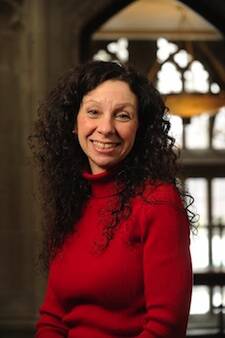What I hoped for was a signature.
When I discovered my old English professor had published a book of poems when she was a young woman and I was 4 years old,
When I clicked the “Add to Shopping Cart” button and paid my $2.99, plus $3.99 for shipping, with my saved American Express,
When the envelope arrived at my house five days later, slim and slight and full of what I knew,
When I slid the little volume out, smelled the sharp scent of book mold, traced the creases on the cover and opened it,
What I hoped for was her familiar hand.
What I found, instead, was her face.
What I picked up with my fingers, charily, warily, was a photograph, faded with age.
What I saw were her eyes, the eyes I’d known, deep and questioning and full of life, looking into the future,
What I read on the back of the photo was “Deborah at 3 years old,” my teacher as a child, her bangs cut straight across, her Peter Pan collar crisply pressed as the collar on the cloth doll she clutched so closely.
How I knew it was true?—those eyes,
Who she’d become already contained within, her spirit clear and shining, the child mother to the woman
Who would teach me to love William Wordsworth, to fear William Blake, to know Percy Shelley for the beautiful madman he was, to argue “inexorably” and to value inordinately the words of the poets and the prophets—
Who would teach me patience and sacrifice—her lifelong care for her disabled sister, her loss of her fiancé, a boy named Will, a World War II pilot who left and never returned—the woman
Who would never age and never marry,
Who would never have children of her own, except for us, young people she would teach with such passion.
How she astonished us?—by walking briskly up 8 flights of stairs to our 8AM class, never losing her breath, while we took the elevator. For “an early-morning walk is a blessing for the whole day.”
How she inspired us?—by speaking of the (many) books she was (forever) reading, while we jotted down the titles, creating a reading list that would occupy us for decades. For “energy is eternal delight.”
How she moved us?—by being present to the word, to the world, and all the blessed creatures in it, including ourselves. “For Mercy has a human heart, / Pity a human face, / And Love, the human form divine.’”
Where that soul had gone,
Who could say?
Who she had loved and who loved her also gone, most likely, except for me,
Who had searched for her for the sake of memory,
Who discovered her long out-of-print collection (so wonderfully) titled The Paradise of the World,
Who had waited for its arrival on the doorstep,
Who had hoped for the unlikely, the less than possible, for the signature and sign, half a century old,
Who received, instead, a relic of her teacher-poet-saint, that miraculous face, those telling eyes, imaged on paper, tucked among her words,
Who treasured the gift, unasked for and undeserved, that arrived like a letter from beyond the World, like grace in the mail, like redemption,
When she received the envelope of surprise,
When she opened the book of Paradise.








